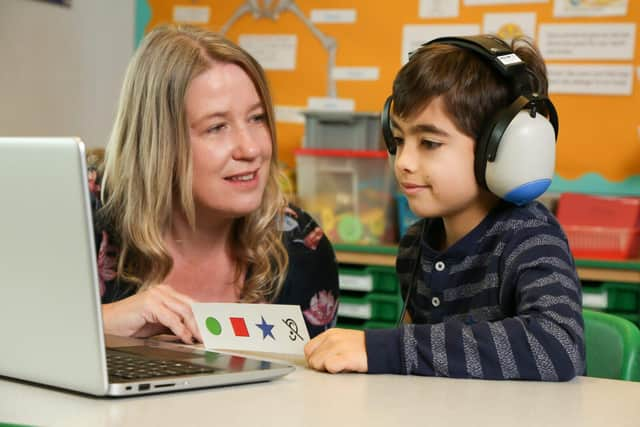Undetected hearing & vision problems could seriously affect children's futures in Barnsley
Undiagnosed vision or hearing problems can impact both a child’s learning and behaviour. When children fall behind in their learning it can affect not only their very early learning, but potentially extend right through to their GCSE results. Undiagnosed sight and hearing problems have also been linked to behavioural issues.
Yet simple to use, accurate screening tests are available. These are specifically designed for school staff, without clinical knowledge to quickly check children. A simple check can reduce pressures on SEN resources and help schools realise inclusion goals. Children with undetected mild to moderate vision or hearing deficits are much more likely to fall behind or have behaviour issues with significant implications for inclusion policies.
Advertisement
Hide AdAdvertisement
Hide AdAlthough primary schools often benefit from NHS vision and hearing screening (often using SchoolScreener software), it’s not universal. Plus, children’s vision and hearing can continue to change well into their teens.


According to Annegret Dahlmann-Noor, Consultant and Director of the Children’s Eye Service at Moorfields Eye Hospital in London and Honorary Clinical Associate Professor at UCL, over the past 50 years, the proportion of young people in the UK who develop myopia (short-sightedness) has doubled[i]. It is thought this may well be down to children spending far less time outdoors and far more time looking at small screens. The same author noted that this progresses as children age, indicating that children need to be checked for vision problems far more regularly, to pick up any issues as soon as they appear.
It has been shown again and again that children with undetected vision or hearing challenges do less well at school, and their learning outcomes and future can be severely affected.
A study conducted in 2019[ii] (https://www.ncbi.nlm.nih.gov/pmc/articles/PMC6542436/ ), looked at the hitherto unknown impact of co-occurring common hearing and visual difficulties in childhood. The results found that these children were less likely to attain the expected academic standards at the end of primary school (not wholly explained by IQ, behaviour, attention or social understanding), which suggested a substantial, unexplained educational disadvantage. It also found they were less likely to achieve five or more GCSEs, which may be associated with poor performance in Key Stage 2 (KS2). The study stated that: “Children with known visual or hearing difficulties should be routinely tested for additional sensory difficulties, as even mild co-occurring visual or hearing deficits are associated with poorer educational outcomes. The impact of co-occurring hearing and visual difficulties on performance at secondary school is largely explained by poor performance at primary school; hence, early identification and intervention is essential.”
Advertisement
Hide AdAdvertisement
Hide AdBy checking children over the age of seven, hearing and vision challenges can be addressed and learning outcomes improved. Disruptive behaviour in schools has also been linked to undetected vision and hearing issues, so checking helps everyone; children, schools, parents and fellow students.
SchoolScreener for Schools was developed specifically to enable any member of school staff (no clinical knowledge required) to carry out checks with just 30 minutes of online training. The software is a variant of SchoolScreener developed by Thomson Screening for use in the NHS. SchoolScreener has been used by non-clinical staff to screen children in over 5,000 schools for a variety of health markers, including over 1.2 million for vision and hearing since 2013. The software was developed from research at City, University of London.
Schools can purchase SchoolScreenerforSchools direct from Thomson Screening. Prices start from £250.00 per annum. After training, the school can arrange to check children, as required, with the system automating everything, including reporting results to parents, carers and teachers. The software includes automatic reporting for School SLTs and for inclusion in OFSTED reporting for welfare/wellbeing and inclusion provision.
SchoolScreener for Schools (Vision and Hearing) is a variantof SchoolScreener for use mainly at Primary and Early secondary. Other applications include health needs, height, weight and colour vision.
ABOUT THOMSON SCREENING
Advertisement
Hide AdAdvertisement
Hide AdThomson Screening is the leading supplier of software for Vision and Hearing Screening and other School Health Needs including Health/Risk Assessments, Immunisations, Height/Weight and associated data management.
The company was founded in 2011 by City, University of London, and further develops and commercialises the work of Professor David Thomson, for 25 years head of Department at the University’s Department of Optometry and Dr. Sebastian Hendricks, Consultant at Great Ormond Street Hospital in Paediatric Audiovestibular Medicine.
Thomson Screening’s products address healthcare, education and workplace needs around the world with the software managing over 3million screenings to date. Customers include the NHS in the UK, non-profit organisations in the USA and NGOs in developing countries. https://schoolscreener.com/
Sources:
Advertisement
Hide AdAdvertisement
Hide Ad[i] https://www.hepi.ac.uk/2021/08/27/the-dramatic-rise-of-myopia-in-young-people/
[ii] https://www.ncbi.nlm.nih.gov/pmc/articles/PMC6542436/